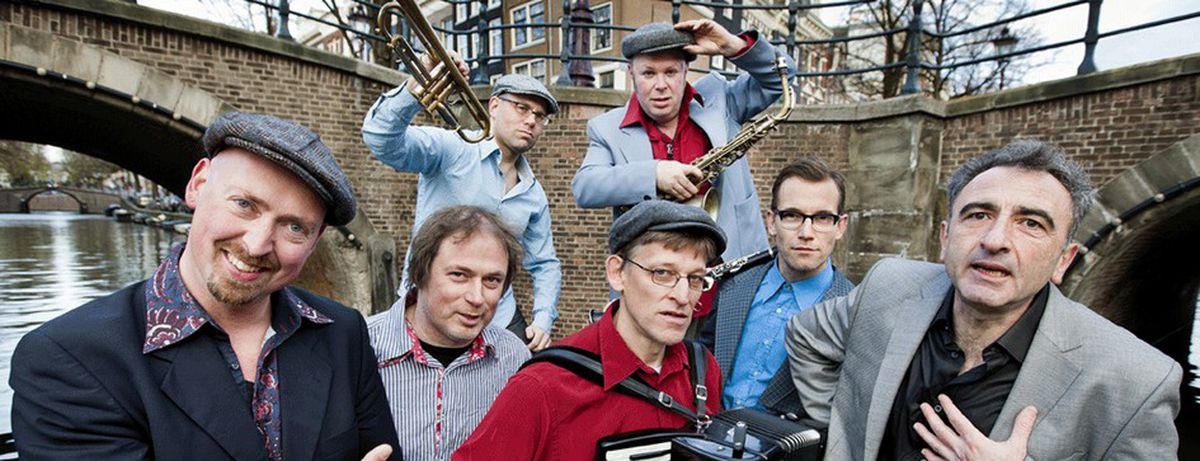
The Amsterdam Klezmer Band
Published on
The Amsterdam Klezmer Band- an eclectic mix of ska, punk, klezmer and any othert influences which come their way! We interviewed their saxophone player, Jopp Chajes, to find out more about the band, their origin and why it's not JUST about klezmer music!
JH-How did you first come into contact with Klezmer? Job- It was by playing in a little circus in Holland. But different people in the band, like the accordionist, were always into folk music. Our clarinet player was into it because of Balkan music; Goran Bregovic kind of stuff, and one particular artist from the beginning of the last century called Mickey Katz. Alec, our singer, was born in the Jewish quarter of Odessa. JH- Does Klezmer have a big tradition in Holland? Job- Zero! Because it’s really Eastern European music. There is a Yiddish tradition in Holland. We also had some famous artist like Leo Fuld, there’s a cabarettist called Li La Lo, and these are people who were singing in Yiddish, but singing in Yiddish is not the same as Klezmer. Klezmer is, in principle, instrumental music. JH- So Klezmer is basically, Jewish, Eastern European music? Job- Yes, Klezmer is a tradition of Jewish wedding music from Eastern Europe. JH- Were the people you met at the circus Jewish? Job- It was like this. The father of some friends of mine, he was playing the accordion in the circus. I met him through my friend. He is also Jewish, he is from New York, but he lives in Amsterdam since the end of the 60s, so he’s an old hippie! But he was playing accordion. We were actually both Jewish and started this music together and that was a strong feeling that we had. We were both Jewish and feeling some roots towards the Jewish heritage. I never grew up with Jewish culture, except from things I didn’t know they were Jewish, but this was clearly a Jewish cultural phenomenon, which is the music which sounded like Klezmer. JH- Did you pick up any different musical influences on the way? Job- Yes, before I played saxophone, I was a rapper in the late 80s, early 90s. I was only into hip-hop, and from hip-hop I came to funk and jazz music, and when I started playing sax, I was playing with Jasper, our bassist. We were playing in a funk/hip-hop together, in 1994, just before we founded the band. Jasper started off as a punk bassist, I started as a rapper, Gijs, our trumpeter, he did jazz conservatory and he is very much interested in modern jazz music. Janfie, our clarinettist, he is actually a saxophonist, and he is interested in a lot of different music- he was playing with a famous ska band from Holland and was influenced by Balkan, jazz and African music. He used to be in the band Rijs, with Morrocans and Algerians. Alec, our singer, is actually not from Klezmer, he sings Russian and Jewish gangster and prison songs. JH- But can you fit all of these influences into klezmer? Job- Well, the thing is, with the seven of us, we have the instruments, we use a certain scale for melody and we use a certain rhythm which makes it “Amsterdam Klezmer Band”, and inside “Amsterdam Klezmer Band” there are a lot of different possibilities. Although we have our name, klezmer is a quarter of the influence that we have. There is a lot of Romanian, Moldovian, Macedonian, reggae, ska, hip-hop, classical and Bulgarian influence. The fact that there are seven of us, and that we choose to have a certain scale you know duh-duh-duh (sings klezmer melody). It’s all these things together, it makes it sound traditional, but it is not. JH- Are there any kind of religious influences? Job- No, it is completely not religious. Only for fun. JH- Is there an underlying message? Job- For me, when I play music, there is always an underlying message- peace, brother hood, togetherness and the wish that everyone in the world gets a good life, and by playing music and making people happy, I think we spread some love and positivity, and that’s the underlying message. Like the latest song I wrote called “een scheen Welt” (a beautiful world). It’s a wish for everyone. JH- Well, on that note, thank you very much for the interview. Job- You’re welcome! By John Hodgshon



